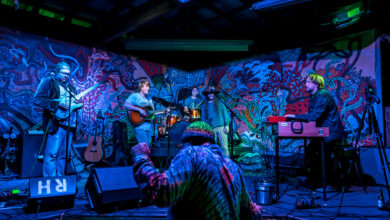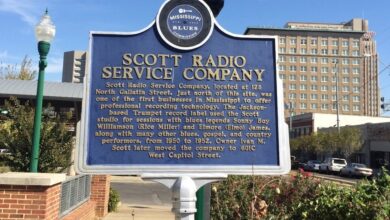Mississippi Songwriters Hall of Fame Induction Ceremony 2023
 By Johnny Cole
By Johnny Cole
Photos by Stephen Anderson
Since 2019, The Mississippi Songwriters Hall of Fame has inducted and paid tribute to many of music’s premiere songwriting talent who have roots in the state that lays claim to being the “Birthplace of America’s Music.” On Thursday, September 21, 2023, the Hall of Fame honored its latest class of inductees, who joined a distinguished and stellar group of Mississippians who have already been inducted into the Hall of Fame. This year’s class features one of rock and roll’s original pioneers; a former Ole Miss star quarterback who went on to write one of the most popular songs of the 20th century; an award-winning songwriter whose music has been recorded in multiple genres, while receiving several awards in gospel; a songwriter often referred to as the first successful female songwriter in country music; and finally, a legendary musician who is referred to by millions as “The Father of Country Music.”
The history of The Mississippi Songwriters Hall of Fame has honored a wealth of amazing talent. In 2019, it inducted country music songwriter Paul Overstreet. This highly attended inaugural ceremony and concert was held at the Mary C. O’Keefe Cultural Arts Center in Ocean Springs, Mississippi, and was a huge success. The following year the Hall of Fame didn’t miss a beat with the inductions of B.B. King, Jimmy Buffett, Mac McAnally, Tommy Barnes, and Reggie Bates. This event was conducted via streaming due to the pandemic. In 2021, Bob Morrison, Craig Wiseman, Paul Davis, Sam Cooke, and Tammy Wynette received inductions and were acknowledged at that year’s Mississippi Songwriters Festival. Thankfully in 2022, the induction ceremony officially returned to The Mary C. O’Keefe honoring Bobbie Gentry, Clay Mills, Conway Twitty, Hank Cochran, Robert Johnson, and the year’s Contributors Award recipient, Tommy Crawford.
This Year’s Inductions with bios written by Johnny Cole (which were recorded and used at the induction ceremony):
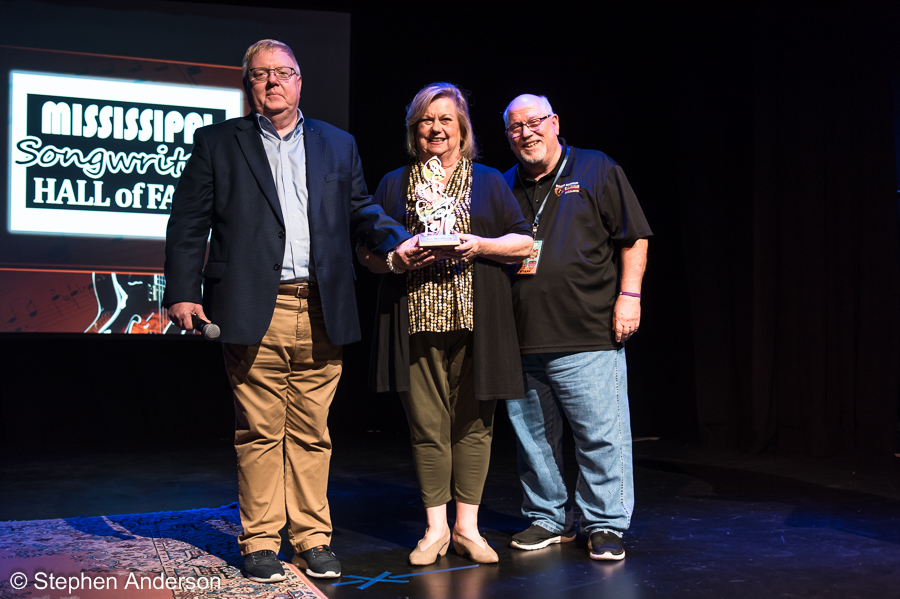 Top photo: Keith Johnson (great-nephew of Muddy Waters with Bo Diddley’s daughter, Evelyn Cooper and grandson, Garry Mitchell performing a Bo Diddley classic; above photo: Jeff Roberson (co-writer of the Jim Weatherly biography “Midnight Train”) and Sen. Lydia Chassaniol accepting Hall of Fame trophy from Kevin Westbrook of the Mississippi Songwriters Alliance.
Top photo: Keith Johnson (great-nephew of Muddy Waters with Bo Diddley’s daughter, Evelyn Cooper and grandson, Garry Mitchell performing a Bo Diddley classic; above photo: Jeff Roberson (co-writer of the Jim Weatherly biography “Midnight Train”) and Sen. Lydia Chassaniol accepting Hall of Fame trophy from Kevin Westbrook of the Mississippi Songwriters Alliance.
Jim Weatherly was the first to be honored. Accepting the award for Weatherly was Jeff Roberson (co-writer of the Jim Weatherly biography “Midnight Train”) and Sen. Lydia Chassaniol. Musical Performance: Award-winning recording artist, Serabee, performed Weatherly’s “Midnight Train to Georgia.”
Bio:
James Dexter Weatherly, born March 17, 1943, in Pontotoc, Mississippi, went from playing football on The University of Mississippi’s undefeated 1962 season to successfully writing music for nearly 50 years. One of Weatherly’s most crowning achievements as a songwriter came in 1973 when a family recording act from Atlanta, Georgia took one of his songs all the way to #1 on both Billboard magazine’s Hot 100 and R&B charts.
Following his college football days as a star quarterback at Ole Miss, Jim Weatherly moved to Los Angeles where he worked as a songwriter and recording artist. His most famous song “Midnight Train to Georgia” was originally titled “Midnight Plane to Houston, a song’s title based on a telephone conversation with actress, Farrah Fawcett, the then-new
During Weatherly’s long and enduring career, his songs were recorded by many successful music artists and performers, including Glen Campbell, Kenny Rogers, Charley Pride, and Ray Price (who recorded a few dozen songs by Weatherly). Gladys Knight and The Pips would record many more songs written by Weatherly, too.
Jim Weatherly recorded several albums during his career and charted with the songs, “The Need to Be” and “I’ll Still Love You.” His many accolades included being inducted into the Nashville Songwriters Hall of Fame, Mississippi Musicians Hall of Fame, and Songwriters Hall of Fame. Weatherly was also named the NSAI’s Songwriter of the Year and ASCAP’s Country Songwriter of the Year in 1974.
On February 3, 2021, 77-year-old Jim Weatherly died from natural causes at his home in Brentwood, Tennessee, leaving us with an amazing list of great songs to be cherished for many years to come.
 Rick McWilliams (great-nephew of Jimmie Rodgers) and Sen. Jeff Tate accepting Hall of Fame trophy from Scott Stradtner of The Mississippi Songwriters Alliance.
Rick McWilliams (great-nephew of Jimmie Rodgers) and Sen. Jeff Tate accepting Hall of Fame trophy from Scott Stradtner of The Mississippi Songwriters Alliance.
Jimmie Rodgers was the second songwriter to be inducted. Accepting the award for Rodgers was his nephew, and Sen. Jeff Tate. Musical Performance: Popular Gulf Coast musician, Ty Taylor, performed a medley of Rodgers’ classics.
Bio:
James Charles Rodgers from Meridian, Mississippi was born on September 8, 1897. Rodgers, known for his distinctive rhythmic yodeling, rose to national prominence during the late 1920s and early 1930s, becoming the first major star of country music. The singer-songwriter is highly regarded for his enormous influence on country music. Rodgers, often referred to as “The Father of Country Music,” inspired many musicians to follow in his footsteps into country music. Subsequently, his influence has crossed over into multiple genres including rock and blues.
Nicknamed “Singing Brakeman,” Rogers, the son of a railroad man, worked the railroads on and off for a dozen years in his teens and twenties. He also tried other odd jobs as well as occasional performances with medicine and minstrel shows. Despite contracting tuberculosis in 1924, Rodgers decided to still pursue his dream and focus on music.
For many years Rodgers pursued a career in music, but it was a few years after receiving the bad news of his sickness that he eventually found success. In the spring of 1927, Rodgers traveled to Asheville, North Carolina, and performed on WWNC, Asheville’s first radio station. A few months later, a weekly slot was secured on the station lineup for Rodgers and a group of musicians recruited from Bristol, Tennessee, which became “The Jimmie Rodgers Entertainers”. By mid-summer, Rodgers and his bandmates learned Ralph Peer, a representative of the Victor Talking Machine Company, was coming to Bristol to hold an audition for local musicians. Later to become known as the Bristol Sessions, these now-famous recording sessions marked the commercial debuts of Jimmie Rodgers and the Carter Family, the first family of country music.
More determined than ever, Rodgers traveled to New York City in the autumn of that same year to arrange more sessions with Peer. Rodgers’ recordings at Victor Studios in Camden, New Jersey would lead him to stardom. His recording of “Blue Yodel” (Blue Yodel No. 1 “T for Texas”) spent 14 weeks atop the Victor sales list. Eventually selling over a million copies, this classic hit became Rodgers’ career top seller. In 1930, Rodgers sang the song in his Columbia Pictures short film The Singing Brakeman.
Interestingly, many of Rodgers’ songs were co-written with his sister-in-law, Elsie McWilliams, who became the first commercially successful female songwriter in country music history. She devoted her time with a huge heart to helping Rodgers as a songwriting contributor, often during difficult times due to his poor health.
During the height of his popularity, Rodgers also undoubtedly did more to popularize the blues than any other performer of his time, black or white. Blues great, Howlin’ Wolf, once stated Rodgers was his childhood idol and when he later tried to emulate Rodgers’ yodel, his efforts sounded more like a growl or a howl, which served him well. Interestingly, more than a third of Rodgers’ music was blues recordings, which he encountered as a young man while working as a railway brakeman and traveling musician. Rodgers’ highly popular “Blue Yodels,” a series of thirteen songs that blended several styles of music composed in blues format earned him the nickname “The Blue Yodeler.”
Rodgers recorded prolifically: 110 titles in less than six years, the equivalent today of two albums a year. Along the way, he expanded the possibilities for country music by recording alongside string bands, jug bands, Hawaiian musicians, pop orchestras, and even jazzman Louis Armstrong on “Blue Yodel No. 9.”
Despite his battle with tuberculosis, Rodgers remained busy recording new music and touring, which did little to help his ailing condition. In May of 1933, Rodgers returned to New York City for what would be his final recording sessions. Even though he was able to record new music, his declining health forced him to have a nurse accompany him to his final recording session while a cot was used for him to rest between songs. The final song recorded by Rodgers was “Years Ago”. Two days after his final session, Jimmie Rodgers died in his New York City hotel room on May 26, 1933. Rodgers was only 35 years old. His body, placed in a pearl grey coffin, was sent by train back to Meridian where he was buried at Oak Grove Cemetery.
Jimmie Rodgers’ endless list of accolades includes inductions into the Country Music Hall of Fame, the Rock and Roll Hall of Fame, the Blues Hall of Fame, the Songwriters Hall of Fame, and others. Rodgers has also been honored with markers on the Mississippi Blues Trail and the Mississippi Country Music Trail. Numerous tribute albums in Rodgers’ honor have been released by artists from various genres.
Jimmie Rodgers is one of the most cherished recording artists in music history. His legacy is timeless.
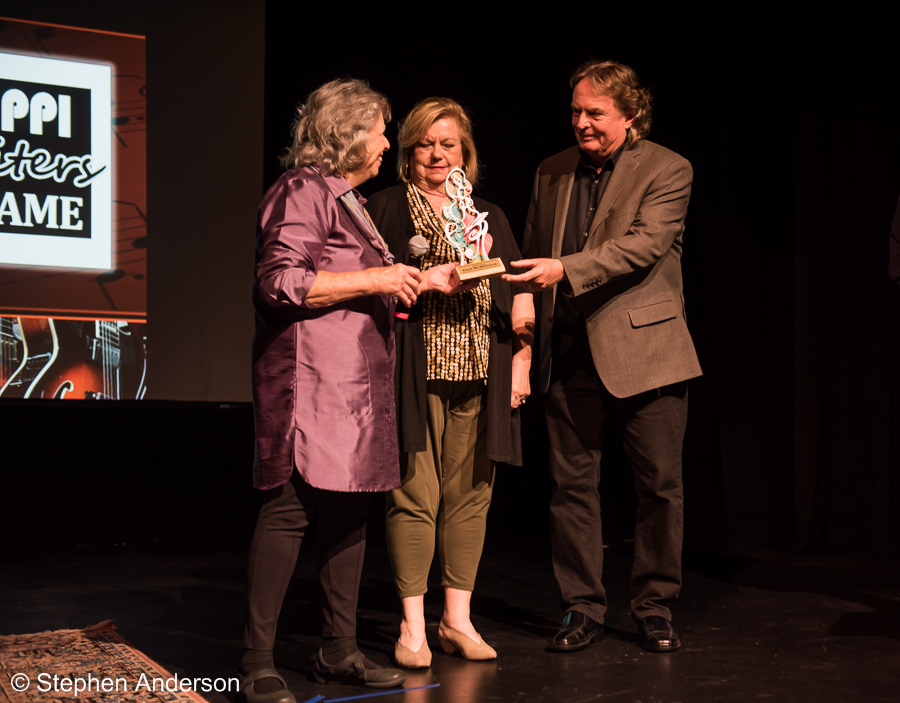 Ms. Judith Snodgrass (granddaughter of Elsie McWilliams) and Sen. Lydia Chassaniol accepting Hall of Fame trophy from Andy Dalgo of the Mississippi Songwriters Alliance.
Ms. Judith Snodgrass (granddaughter of Elsie McWilliams) and Sen. Lydia Chassaniol accepting Hall of Fame trophy from Andy Dalgo of the Mississippi Songwriters Alliance.
Elsie McWilliams was the third songwriter to be inducted. Accepting the award for Mrs. McWilliams was Ms. Judith Snodgrass (granddaughter of Elsie McWilliams) and Sen. Lydia Chassaniol. Musical Performance: Songwriter and Educator, Tricia Walker, performed a classic by McWilliams.
Bio:
Mississippi can take pride in having so many trailblazers and talented people who helped lay the groundwork for the music we enjoy today. One person who is recognized as a pioneer in music is none other than Elsie McWilliams, country music’s first female songwriting success.
McWilliams, born Elsie Williamson on June 1, 1896, in Harperville, Mississippi, was one of nine children raised in a very musically inclined family. She and her siblings regularly performed at her Methodist minister father’s church services. A young Elsie also played organ at his religious revivals.
Following her graduation from high school, Williamson taught school and did so until her marriage to Dick McWilliams, a policeman in Meridian, Mississippi. One of McWilliams’ earliest jobs in music was accompanying silent movies on piano in one of the city’s theaters. In 1920, her sister, Carrie, married Jimmie Rodgers, the future “Father of Country Music.” When Rodgers formed a local dance band, he asked his sister-in-law, Elsie, to sing and play piano in the band.
When Jimmie Rodgers secured a recording contract in 1927, he wanted McWilliams to write songs with him. She loved writing songs and the ideas for her songs often “came from conversations.” She said, “When an idea hit me, I would have to write it down that minute or it would get away.” Since Rodgers could not read music, McWilliams would play the songs as he would learn them by ear. The first song she wrote for him was “A Sailor’s Plea.”
McWilliams finally agreed to travel with Rodgers to recording sessions and collaborated with him on many of his most popular songs. She wrote or co-wrote approximately a third of Rodgers’ songs. In fact, many of the collaborated songs were not credited to her. She did not want her name attached to the rowdier songs and eventually after Rodgers’ health declined she wanted the money from those songs to go to Rodgers’ family. She often gave her royalties to them.
Though she traveled with Rodgers to many of the early recording sessions, she missed her family and eventually decided to return home to Meridian and be a homemaker. Following Rodgers’ death in 1933, McWilliams focused her life more on her family and church. She also provided some memorial songs about Rodgers to a young Ernest Tubb. In 1938, she and her sister made some recordings in memory of Rodgers, too.
McWilliams spent much of the remainder of her life kindly welcoming Rodgers’ fans to Meridian. On Dec. 30, 1985, at the age of 89, Elsie McWilliams passed away, leaving behind a legacy that has been honored by the Nashville Songwriters Hall of Fame and a marker on the Mississippi Country Music Trail.
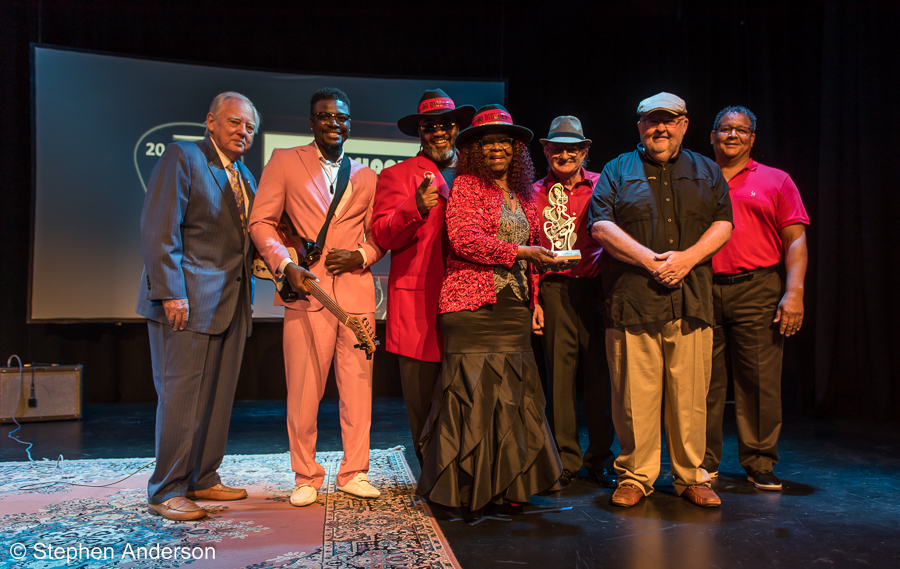 Mississippi State Rep. John Read, Keith Johnson (great-nephew of Muddy Waters) joined the family of Bo Diddley to accept trophy from George Cumbest of the Mississippi Songwriters Alliance.
Mississippi State Rep. John Read, Keith Johnson (great-nephew of Muddy Waters) joined the family of Bo Diddley to accept trophy from George Cumbest of the Mississippi Songwriters Alliance.
Bo Diddley was the fourth songwriter to be inducted. Accepting the award for Bo Diddley was the family of Bo Diddley; Musical Performance: Blues musician Keith Johnson (great-nephew of Muddy Waters) was joined by Evelyn Cooper (daughter of Bo Diddley) and Garry Mitchell (grandson of Bo Diddley) to perform some incredible Bo Diddley classics.
Bio:
Ellas McDaniel (born Ellas Bates on December 30, 1928, in Pike County, Mississippi) became famous to the entire world as Bo Diddley, one of the true founders and inventors of rock ‘n’ roll. The future rocker was adopted and raised by his mother’s cousin, Gussie McDaniel, whose surname he assumed. In 1934, the McDaniel family moved to the South Side of Chicago.
At a young age, the future Bo Diddley took up classical violin as taught to him at the famous Ebenezer Baptist Church, and at age twelve received his first guitar. His unique approach to guitar, he recalled, stemmed largely from his attempts to imitate the sound of a bow on a violin. After enrolling in vocational school, he built his own guitar as well as a violin and an upright bass. Diddley is recognized for his technical innovations, including his distinctive rectangular guitar, with its unique booming, resonant, shimmering tones.
Inspired by a fellow Mississippian John Lee Hooker’s performance on the radio, Diddley supplemented his income as a carpenter and mechanic by playing music on street corners with friends. He eventually performed in clubs alongside several well-known Chicago bluesmen. In 1955, Diddley was signed to Checker Records by Leonard and Phil Chess. Diddley’s first release was the two-sided single “Bo Diddley” with his trademark beat and “I’m a Man” on the flip side.
Diddley wrote and recorded several more songs at Checker Records including “Who Do You Love?”, a song later covered by everyone from Ronnie Hawkins and The Hawks to George Thorogood and the Destroyers. Some other songs by Diddley: “Hey! Bo Diddley,” “Say Man,” and “Road Runner.” In 1957, the duo of Mickey & Sylvia released the #1 R&B single “Love is Strange,” a song written by Bo Diddley, but under the name of his then–wife. That song has been used in countless films and television shows.
Though only a few of his songs found charting success, Bo Diddley is one of the most influential performers in music history. His use of African rhythms and a signature beat, a simple five-accent rhythm, is a cornerstone of hip-hop, rock, and pop music. Diddley’s influence is apparent in an array of music artists and that unique Diddley beat can be heard in such songs as Buddy Holly’s “Not Fade Away,” Johnny Otis’s “Willie and the Hand Jive,” The Who’s “Magic Bus,” Bruce Springsteen’s “She’s the One,” The Strangeloves’ “I Want Candy,” George Michael’s “Faith,” and U2’s “Desire.” From his induction into the Rock and Roll Hall of Fame to a Grammy Lifetime Achievement Award, Diddley’s accolades are also endless.
In 2006, he participated as the headliner of a grassroots-organized fundraiser concert to benefit the town of Ocean Springs, Mississippi, which had been devastated by Hurricane Katrina. When asked about the fundraiser, Diddley stated, “This is the United States of America. We believe in helping one another.”
Sadly two years later, Bo Diddley died on June 2, 2008, of heart failure at his home in Archer, Florida at the age of 79, leaving behind an incredible legacy.

Brad Bohannon of the Mississippi Songwriters Alliance with Don Poythress and Sen Jeff Tate.
Don Poythress was the fifth songwriter inducted. Accepting the award was Poythress, who also performed several of his songs.
Bio:
“Country music has always captivated me, but the first music I remember learning was worship songs that my mom taught me. In particular, ‘Jesus, There’s Something About That Name.’”
Don Poythress from Meridian, Mississippi has enjoyed a successful career as a songwriter since the 1980s, yet has always recognized his strong spiritual faith as an inspiration. Even at a very early age, his future path was being laid out in such a way. When Don was only four years old, his piano instructor, a deeply spiritual woman, told him “Now one day the Lord is going to use you in country music, and you’re going to be on the Grand Ole Opry. He’s going to use you to draw people, and you’re going to tell them about Christ.” Yes, quite a heavy statement to tell a young child, but the words turned out to be true. Don Poythress has lived in Nashville since 1986 and is one of today’s premier songwriters.
In addition to his strong spiritual faith, Don, like so many other songwriters and music artists, has drawn inspiration from those who came before him and paved the way. He learned the art of songwriting and performing by listening to country music legends such as Johnny Cash and Glen Campbell, and Christian artists like Dallas Holm and Dottie Rambo.
Don has penned songs that have been recorded by Willie Nelson, Bonnie Raitt, Sheryl Crow, Tim McGraw, Daryll Worley, Sir Cliff Richard, The Backstreet Boys’ Brian Littrell, Lincoln Brewster, Blake Shelton, Earl Scruggs, Kari Jobe, Jake Owen, and Jason Crabb among many others.
Don’s incredible talent has been honored with multiple accolades crossing over into several genres. His song “A Little More Country Than That” recorded by Easton Corbin went to #1 and was nominated for both a CMA and ACM Song of the Year. Kelly Pickler had a hit with “Things That Never Cross a Man’s Mind.” Other recent singles written by Don Poythress include Jake Owen’s “Tell Me” and The Henningsen’s “I Miss You”.
Don Poythress has won several Dove Awards including one for The Martins’ recording of “The Promise,” which won in the category of Top Southern Gospel Song in 2004. He also won a 2011 Dove Award for Jason Crabb’s version of “Joseph” in the Inspirational Song of the Year category. And his third Dove Award was for Karen Peck and New River’s recording of “Revival” in the Southern Gospel category.
Don Poythress’ most recent album Wash Away, which featured guest artists Ricky Skaggs, Paul Baloche, Susan Ashton, and Jared Anderson, was released to positive reviews. One reviewer said, “Don Poythress’ Wash Away features vibrant songs, powerful lyrics, and styling that is modern acoustic worship at its best.”
Don is also known as a performer in his own right. Fulfilling his piano teacher’s prophecy, he has performed at The Grand Ole Opry. Poythress has also appeared on such stages as The Ryman Auditorium, The Louisiana Hayride, and as a regular performer at The Bluebird Café.
Today, along with his songwriting and performing, Don enjoys sharing what he’s learned by teaching songwriting skills. He has taught songwriting workshops at Vanderbilt University, Belmont University, Nashville Songwriters Association International, BMI, ASCAP, The Christian Musician Summit, and many other places.
Don considers himself blessed to be the worship leader at Abundant Life Church in Mt. Juliet, Tennessee for the last 28 years. Don Poythress remains an active presence in songwriting and within the music industry.

This year’s Mississippi Songwriters Hall of Fame Induction Ceremony was a huge success as it kicked off another fabulous Mississippi Songwriters Festival. Visit our second page for more photos by Stephen “Andy” Anderson.
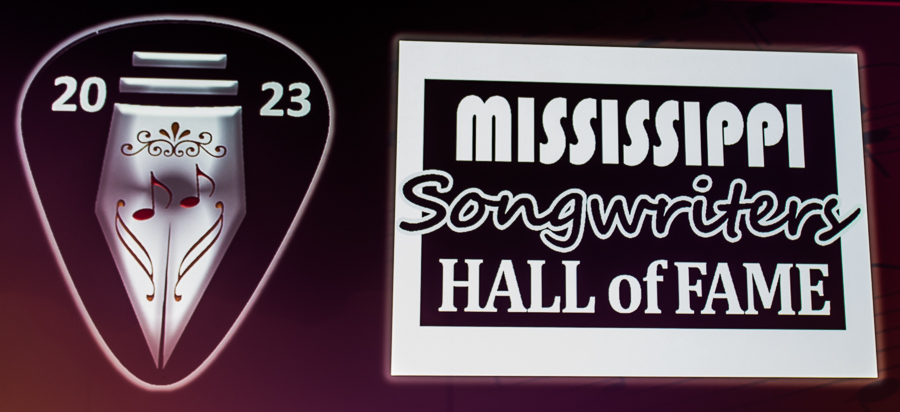
Page Designed & Edited by Johnny Cole
Additional Editing by Deborah Chatham
© The Southland Music Line. 2023. All rights reserved

COPYRIGHT NOTICE: We welcome requests for permission to use content from The Southland Music Line website and Facebook page. Any shared articles or photos may not be altered, edited nor cropped and must include the appropriate copyright of The Southland Music Line.


